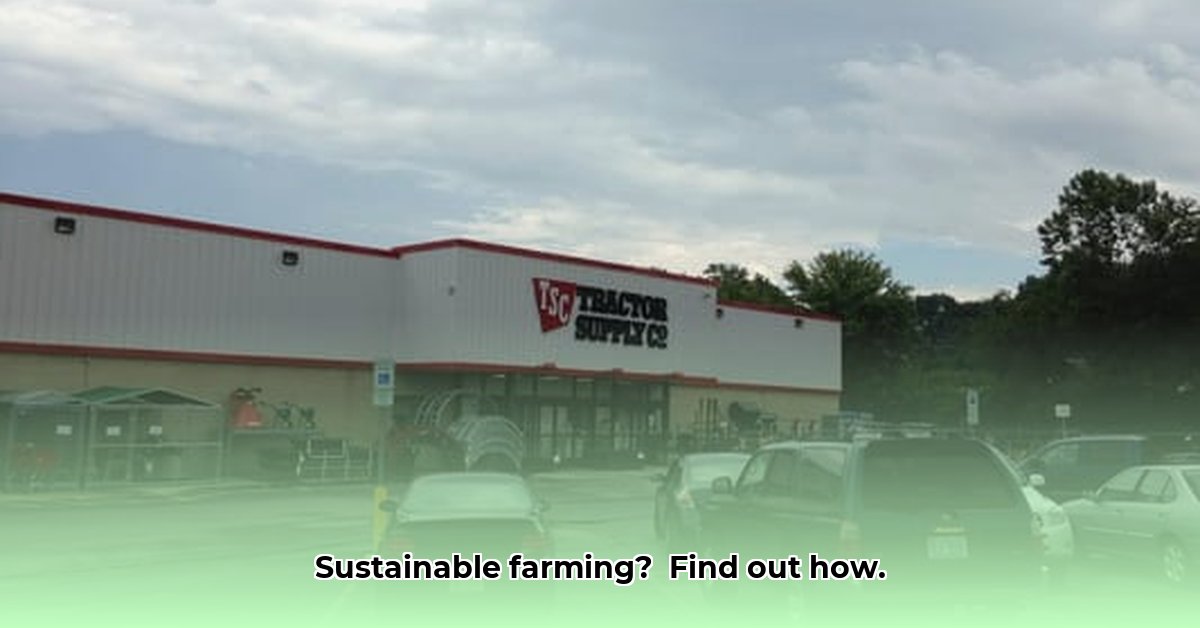
Rural Hall, North Carolina's Tractor Supply Company (TSC) store is a cornerstone for local farmers, providing convenient access to essential agricultural supplies. This accessibility potentially fosters more efficient, and thus more sustainable, farming practices. However, a critical examination reveals a significant gap in information regarding TSC's own environmental impact and its role in promoting sustainable agriculture within the wider community, including Walkertown, Tobaccoville, and Winston-Salem. This article investigates TSC's true contribution to sustainable farming in the region. For more on pasture fertilizer options, see this helpful resource: Pasture Fertilizer Guide.
Accessibility and Perceived Benefits
The store's convenient location undeniably benefits local farmers, reducing travel time and fuel consumption, thereby lowering their carbon footprint. This readily available access to necessary supplies contributes to operational efficiency. However, this convenience only represents a fraction of the overall sustainability equation; a comprehensive assessment necessitates a deeper dive into TSC's internal practices.
The Sustainability Gap: A Lack of Transparency
A major obstacle in evaluating TSC's sustainability is a critical lack of publicly available data. Crucial information regarding sourcing practices for its products, manufacturing processes employed by its suppliers, waste management protocols (including packaging disposal and recycling programs), and the store's overall environmental footprint remains unavailable. This absence of transparency severely hinders any objective analysis of its contribution to sustainable agriculture. Without this data, it's impossible to determine the full extent of TSC's environmental impact, both positive and negative.
Competitive Analysis: A Benchmarking Need
A comprehensive analysis requires a comparative study of TSC’s sustainability practices against those of its competitors. Detailed data on competitors’ supply chain practices, environmental footprints, and commitment to sustainable initiatives is essential. Such a comparison would provide concrete benchmarks and highlight whether TSC is a leader, laggard, or somewhere in between within the rural agricultural supply industry. This comparison is crucial for a balanced and informed assessment.
Stakeholder Perspectives: Diverse Voices, Shared Concerns
To gain a holistic understanding, diverse perspectives are crucial. This includes direct input from local farmers regarding the availability of sustainable products and TSC's support for eco-friendly farming practices, along with insights from TSC's management (if accessible), local government officials involved in promoting sustainable agriculture, and local environmental NGOs actively advocating for environmental protection. This multifaceted approach ensures a nuanced and balanced perspective.
Regulatory Compliance: Meeting the Standards
A thorough investigation must also examine TSC’s compliance with existing environmental regulations at the local, state, and federal levels. Understanding the relevant legal framework governing sustainable agriculture and TSC’s adherence to these rules provides essential context and helps shed light on any potential gaps in regulatory compliance.
Conclusion: A Call for Transparency and Actionable Steps
The current lack of transparency surrounding TSC's sustainability initiatives significantly hampers a thorough assessment of its contribution to sustainable agriculture in Rural Hall. To address this, a comprehensive audit of TSC's supply chain and in-store operations is urgently needed, with findings publicly disclosed. This includes detailed reporting on emissions, water usage, waste management, and sourcing and manufacturing practices. Further actionable steps include:
- Enhanced Transparency: TSC must actively and transparently publish comprehensive data regarding its environmental footprint and sustainability initiatives.
- Collaboration with Stakeholders: TSC must actively engage with local farmers, government agencies, and environmental groups to facilitate the transition toward more sustainable practices.
- Incentivizing Sustainable Farming: Local governments should develop and implement effective policies and financial incentives to promote sustainable farming practices.
- Independent Audits: Independent audits should be conducted to verify TSC’s claims and provide an unbiased assessment of its sustainability performance.
This investigation underscores the urgent need for increased transparency and action from all stakeholders involved. Only through open communication, collaboration, and a commitment to data-driven assessments can we fully grasp TSC's impact on sustainable agricultural practices in Rural Hall and surrounding communities.